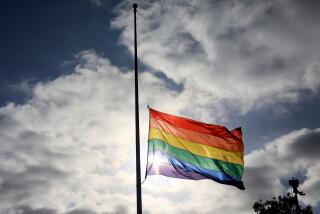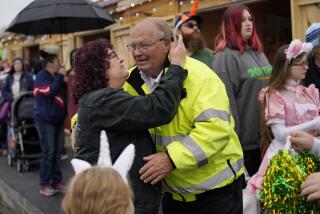People Gather to Settle Pain
- Share via
ABBEVILLE, S.C. — By car, by foot, by Greyhound bus, the descendants of a black farmer named Anthony Crawford came back here Tuesday to accept an apology for his lynching.
They gathered in an unadorned yellow-brick church in the city that proudly claimed it was “the birthplace and the deathbed of the Confederacy.” They waved trembling hands as a series of white preachers asked forgiveness for the slaying that took place 89 years ago in the town’s Court Square.
For the record:
12:00 a.m. Aug. 3, 2005 For The Record
Los Angeles Times Wednesday August 03, 2005 Home Edition Main News Part A Page 2 News Desk 1 inches; 50 words Type of Material: Correction
Lynching apology -- A July 13 article in Section A article about a group of white preachers gathering to issue an apology for a lynching 89 years ago in South Carolina described the father of minister Johnson Dorn as a U.S. senator. William Jennings Bryan Dorn was a U.S. representative.
This summer has churned up painful history from the civil rights era with the trial of former Klansman Edgar Ray Killen and the exhumation of the body of lynching victim Emmett Till. Those cases reverberated in national news, but the service in Abbeville stood out for its intimacy: In the pews of the Friendship Worship Center, neighbors shouted and prayed together about a crime that had not been openly discussed for generations.
“We do believe that when this is over, we will hold our hands in prayer together,” Pastor Wendell Rhodes said before the service began. “We do believe we will walk out of there with one bias, and that bias is love.”
Rhodes decided to organize the service after the U.S. Senate issued an apology last month for its failure to try to stop lynchings that terrorized African Americans well into the 20th century.
Crawford’s death is not a comfortable topic in Abbeville, and there was a scattering of white faces in the pews. Johnnie Waller, the mayor of the neighboring hamlet of Calhoun Falls, said even for him -- the first black elected official in his town -- appearing at the service meant taking a political risk.
“That’s a pretty big biscuit to bite off for that pastor,” said Waller, 65. “I might take a beating across the head for participating.”
Crawford’s death at the hands of his Abbeville neighbors -- sparked by an argument over the market price of cottonseed -- was so outrageous that it became a rallying cry as the National Assn. for the Advancement of Colored People undertook an antilynching movement, said Fitzhugh Brundage, a historian at the University of North Carolina at Chapel Hill who has researched lynching.
Born into slavery, Crawford had gradually accumulated 427 acres of “the prettiest cotton you ever saw,” as one contemporary reporter put it, and had an estimated worth of $20,000. According to news accounts at the time, Crawford cursed a shopkeeper who offered him 85 cents a pound -- he said the market rate was 90 -- and, when he angrily left the shop, a crowd began to gather to give him a beating. Crawford hid in a cotton shed, then hit one of his assailants on the head with a hammer, breaking his skull.
The sheriff at the time, R.M. Burts, begged the crowd not to hurt Crawford and took him into custody. But the crowd stormed the jail, tied Crawford’s body to the back of a buggy and dragged him through black neighborhoods.
Finally they hung his body from a tree and shot about 200 rounds into it, in front of a crowd that reportedly numbered in the hundreds. Crawford’s body has never been found. Although the then-governor of South Carolina ordered an investigation, witnesses denied that they could recognize anyone in the mob, according to an account by local historian Lowry Ware. A grand jury considered the case in 1917 but did not hand up any indictments.
The story stands out even in the history of lynchings because Crawford was a prominent man and had not been accused of a violent crime.
“Here was an instance of an affluent black man being lynched for what can only be described as the status envy of whites,” Brundage said. “If it happened to Anthony Crawford, it could happen to anybody.”
But if the NAACP spread the word of Crawford’s killing, the opposite happened in Abbeville. Most whites interviewed said they had only recently learned about the lynching.
When Rose-Marie Williams, 68, interviewed Abbeville residents about racial tension, she found “that nobody in my generation knew the story” of the lynching.
Robert Speer, president of the Abbeville County Historical Society, said most natives regarded the lynching as “more of a family issue than a community issue” if they know the story at all. “It’s an unfortunate thing that happened,” said Speer, 57. “I don’t think people take pride in it. But it’s history, and the general public is not interested.”
About 350 people -- including an estimated 25 descendants of Crawford -- attended Tuesday’s service, where a series of white pastors assumed responsibility for the racism of the past. Pastor Johnson Dorn, whose father was a U.S. senator from South Carolina, described going home, shaken, to ask his father whether it was true that one of his relatives had been involved in a lynching in the town of Edgefield.
“When he bowed his head, I knew it was true,” Dorn said. “I am here tonight in the first person. The torturous history of the Civil War ... and lynching was the history that surrounded me and my family. Tonight I need deliverance from that history.”
“My story is your story and your story is my story,” he continued. “So what if you were not in that lynch mob in 1916? Vicariously, you were there.”
Eugene Crawford, 82, a grandson of Anthony Crawford’s, rode a Greyhound bus from Philadelphia to attend the service. He left the city when he was 19, but this time returned, he said, to a changed place. “I didn’t ever think I’d see a day like this one,” he said. “I feel happy and safe.... I think I could live here now.”
There were some in town, though, who rejected the very premise of an apology.
Abbeville is the home base for the League of the South, a Confederate heritage organization attracted by the history of the town -- it was the site of South Carolina’s secession from the union in 1860, and Jefferson Davis was staying with a friend in Abbeville when he agreed to end the Civil War.
Robert Hayes, the organization’s state director, condemned the killing as an illegal act, but joked that he had considered attending the reconciliation service because he “had never seen a 200-year-old person before.”
“No one can logically apologize for another individual,” Hayes said. “He can only apologize for transgressions that he himself has made.” The service, he said, “accomplishes absolutely nothing.”
Philip Crawford, the farmer’s 52-year-old great-grandson, who lives in Abbeville, said he had never talked about the crime with descendants of the whites who took part in the killing. He said he suspected they were wary of the topic because of the savagery of his great-grandfather’s death -- and the force of his defiance.
“Look at it this way,” Crawford said. “When a man stands up to a mob, when he stands there and fights to his death, knowing that’s the way it’s going to end up,” if you were the descendant of someone in the mob, “would you want to deal with that man or his family later on in life?”
The most enthusiastic probing about the lynching has come from Crawford relatives who moved to Illinois when the family scattered out of South Carolina after Crawford’s killing.
Doria Dee Johnson, 44, a great-great-granddaughter of Crawford’s who has written extensively about the lynching, said she had felt uncomfortable during her trips to Abbeville. She said she was a little concerned for the pastor who organized the service.
“He seems sort of nonchalant,” Johnson said. “I hope he realizes what he’s doing.”
More to Read
Sign up for Essential California
The most important California stories and recommendations in your inbox every morning.
You may occasionally receive promotional content from the Los Angeles Times.













